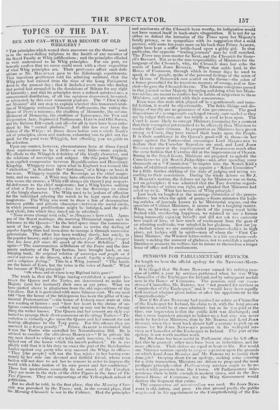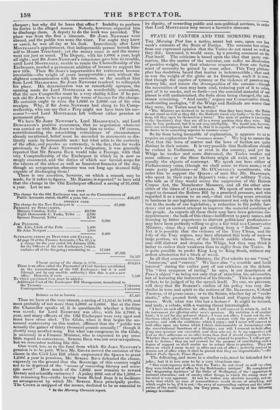PENSIONS FOR PARLIAMENTARY SERVICES.
AT length we have the official apology for the NEwrowr-Moxx- EAGLE job.
It is alleged that Sir JOHN Nsovrour earned his retiring pen- sion of 1,000/. a year by services pertbrmed when he was Whig Chancellor of time Exchequer fir Ireland, and by subsequent useful- ness in the House of Commons. The pension, said our recon- structed Chancellor, Mr. BARING, was " not granted for services as Comptroller of the Exchequer," and it would have been equally well merited whether given before or after his appointment to the Comptrollership." Now it' Sir ;Ions Nrwrorer had received no salary as Chancellor of the Exchequer for Ireland, his claim to it, with the long arrears of interest, would be at once admitted: but as he was paid at the time, our impression is that the public debt was discharged; and that a more impudent attempt to bolster up a bad case was never made by hard-run Ministers, than by Mr. Baum; and Lord Joux ltussm.t. when they went back almost half a century to pick up an VNCGS0 for Sir JOHN NEWPORT'S pension in his well-paid ser- vices as Chancellor of the Exchequer in Ireland. This part of the apology is not worth another word. But Sir Jon:: has bean useful in Parliament since he left office Let this be granted : other men have been as industrious. and far more efficient. Their claims are equal at least to his. But would any Minister venture openly to propose a pension upon the grounds on which Lord Jolts Russtat. and Mr. 11.tEING try to justify their done job ? Groping about tbr an apology, seeking some covering for a .iirty transaction, Ministers are driven to propound the most profligate principle—that Parliamentary services ought to be re- warded with pensions from the Crown. Of Parliamentary tilde- pendenee there is little enough in modern times, and in the Re- formed House of Commons ; but the Whig Government would destroy the fragment that exists. The ariramentom ad miserieordiam was used. Sir Jour NEW: PORT is old, infirm, and poor. On that ground partly, the public acquiesced in his appointment to the Commiptrollerslmip of the Ex- chequer ; but why did he leave that office ? Inability to perform its duties is the alleged reason. Nobody, however, expected him to discharge them. A deputy to do the work was provided. The place was from the first a sinecure. Sir JOHN NEWPORT went abroad, and the public was none the wiser. For aught they knew or cared, be was all day at his desk. Immediately after Lord MONTEAGLE'S appointment, that indispensable person betook him- self to Mount Trenchard; yet the money came in and the money went out just as usual. The Deputy, with his 1,0001. a year, kept all right ; and Sir JOHN NEWPORT'S conscience gave him no trouble, until Lord MONTEAGLE, unable to retain the Chancellorship of the Exchequer, needed a permanent addition of income to support his new title. Then Sir JOHN'S importunities for retirement became irresistible—the weight of years insupportable ; and, without the slightest communication with his successor, or the smallest hint from Lord MELBOURNE, Sir JOHN NEWPORT resolved to relinquish his place. His determination was so remarkably apropos, the opening made for Lord MONTEAGLE so wonderfully convenient, that the new Comptroller must be a very shabby fellow if he per- mit old Sir JOHN to be a penny the worse of income for the change. He certainly ought to raise the 1,0001. to 2,0001. out of his own receipts. Why, if Sir JOHN NEWPORT had clung to his Comp- trollership, who can say that a Tory might not have been his suc- cessor ?—and Lord MONTEAGLE left without either pension or permanent place. We have Sir JOHN NEWPORT'S, Lord MELBOURNE'S, and Lord DUNCANNON'S positive assurances, that no negotiation whatever was carried on with Sir JOHN to induce him to retire. Of course, notwithstanding the astonishing coincidence of circumstances already mentioned, belief must be accorded to statements so dis- tinctly made by honourable men : but what adds to the curiosity of the affair, and puzzles us extremely, is the filet, that for weeks previously to Sir JOHN NEWPORT'S resignation, it was generally reported that Mr. SPRING RICE would take a Peerage, with that very Comptrollership of the Exchequer in which he is now so snugly ensconced, and the duties of which now furnish scope for the talents of the ablest as well as honestest financier of the day, though an octogenarian absentee was not long ago deemed fully capable of discharging them!
There is one assertion, however, on which a remark may be made, for it refers to figures. Mr. BARING is reported* to have said that the change in the Old Exchequer effected a saving of 31,0001. a year. Let us see.
OLD COST.
The charge for the Old Exchequer was, not as the Commissioners of
Public Accounts stated, 44,489/. a year, but X49,477 £7,000 8,100 2,400
SUPERANNCATIONS OF DEPUTIES AND ClUnKS, At page 78 of the Finance Accounts, (No. 67,) is a charge for the year ended 5th January 1839, for the Officers of the late Exchequer, (which
excludes all of the foregoing) amounting to 17,023 27,523 34,523
Utmost saving of the charge in 1839 £14,954
There is an office called the Paymaster of Civil Services established on the reconstruction of the Old Exchequer ; but it is said (though not by any credible authority) that this is not a new office. however, it costs 7,529
To which questioned item must be added—
Additional Cost of the Exchequer Bill Management, transferred to the Treasury Unknown Contingencies Unknown Balance so far as known £7,425
Thus we have at the very utmost, a saving of 14,9541. in 1839, and most probably of not more than 5,0001. or 6,000/. But at the time the Chancellor speaks of; it is questionable whether a farthing was saved; for Lord Rernunsr was alive, with his 2,7001. a year, and many officers of the Old Exchequer were very aged and must have since died. The Globe, when it first began the au- tumnal controversy on this matter, affirmed that the " public was actually the gainer of thirty thousand pounds annually !" though it shortly sang another song. But what was congruous in the Globe, is unseemly in a Finance Minister, who is expected to. pay some little regard to correctness. SPRING RICE was not over-scrupulous, but we remember nothing like this. One word, too, as to the fund from which Sir JOHN NEWPORT'S pension is to be paid. When Mr. GROTE moved the omission of the clause in the Civil List Bill which empowered the Queen to grant 1,2001. a year in pensions, Mr. SPRING RICE defended the clause, expressly on the ground that the Sovereign of this country ought not to be deprived of the "means of rewarding literary and scien- tific merit." How much of the 1,2001. now remains to reward literary and scientific eminence ? A paltry 2001. out of the 1,2001.— the remaining five-sixths having been filched from it to facilitate an arrangement by which Mr. SPRING RICE principally profits. The Crown is stripped of the means, declared to be so essential to * In the Morning Chronicle report.
PRESENT COST.
The charge for the New Exchequer is PENSIONS TO SINECURISTS, Marquis Camden, Teller • £2,700 Right Honourable C. Yorke, Teller ... 2,700 Spencer Perceval, Teller 2,700
Jos PENSIONS,
Mr. Ellis, Clerk of the Pelts 1,400 Sir John Newport 1,000
its dignity, of rewarding public and non-political services, in order that Lord Mown:AGEE may secure a lucrative sinecure.



























 Previous page
Previous page